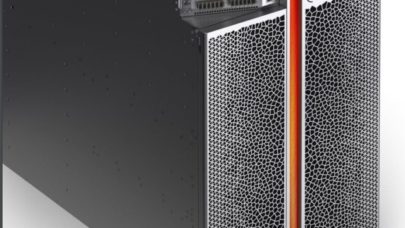
EPCC Bets on Cerebras CS-1 to Boost AI Capabilities in EDIF Buildout
February 3, 2021
EPCC, the supercomputing center at the University of Edinburgh, today announced plans to deploy a combination HPE/Cerebras system in its growing Edinburgh Inter Read more…

A BoF to Boost Your Supercomputing Outreach Skills
November 9, 2016
In this Q&A, University of Edinburgh researcher Nick Brown discusses an upcoming SC BoF, titled "HPC Outreach: Promoting Supercomputing to the Next Generation." The BoF, organized by Brown and two of his colleagues, focuses not only on outreach to different groups of people, but also some of the questions around diversity and ways to best design activities that are inclusive to all. Read more…

Wave Energy Gains Momentum with HPC
July 30, 2014
You are no doubt familiar with solar parks and wind farms, but what about wave farms? With the disastrous implications of climate change pushing government and Read more…

Team EPCC Reveals Secret Weapon Behind Winning Linpack Score
July 3, 2014
When Team EPCC first announced that they had earned “Highest Linpack” at ISC'14 Student Cluster Competition with a score of 10.14 teraflops, they said to s Read more…

EU Launches HPC Cloud Experiment
October 11, 2013
Edinburgh Parallel Computing Centre (EPCC) is announcing a new HPC cloud project, called Fortissimo, aimed at boosting the competitiveness of European industry, specifically small and medium-sized enterprises (SMEs) who use digital simulation and modeling. Read more…

ADEPT Emphasizes Energy-Efficient Parallelism
August 29, 2013
The EU-funded ADEPT project is exploring the energy-efficient use of parallel technologies by combining the talents of HPC and the embedded sector. The goal is to develop a tool for modeling and predicting the power and performance characteristics of parallel systems. Read more…

UK Creates Massive 200,000-Core ‘HPC Service’
February 7, 2013
The United Kingdom is rapidly ramping up its HPC capabilities. The nation just launched its third HPC service in the last 12 months, a 200,000-core powerhouse, called "Accelerator," designed to accommodate a wide range of academic and industry workloads. Read more…

Soft Serve Supercomputing
July 27, 2012
Scientists use latest Cray supercomputer to figure out how to make better ice cream. Read more…

- Click Here for More Headlines

Whitepaper
Transforming Industrial and Automotive Manufacturing
In this era, expansion in digital infrastructure capacity is inevitable. Parallel to this, climate change consciousness is also rising, making sustainability a mandatory part of the organization’s functioning. As computing workloads such as AI and HPC continue to surge, so does the energy consumption, posing environmental woes. IT departments within organizations have a crucial role in combating this challenge. They can significantly drive sustainable practices by influencing newer technologies and process adoption that aid in mitigating the effects of climate change.
While buying more sustainable IT solutions is an option, partnering with IT solutions providers, such and Lenovo and Intel, who are committed to sustainability and aiding customers in executing sustainability strategies is likely to be more impactful.
Learn how Lenovo and Intel, through their partnership, are strongly positioned to address this need with their innovations driving energy efficiency and environmental stewardship.
Download Now
Sponsored by Lenovo
Whitepaper
How Direct Liquid Cooling Improves Data Center Energy Efficiency
Data centers are experiencing increasing power consumption, space constraints and cooling demands due to the unprecedented computing power required by today’s chips and servers. HVAC cooling systems consume approximately 40% of a data center’s electricity. These systems traditionally use air conditioning, air handling and fans to cool the data center facility and IT equipment, ultimately resulting in high energy consumption and high carbon emissions. Data centers are moving to direct liquid cooled (DLC) systems to improve cooling efficiency thus lowering their PUE, operating expenses (OPEX) and carbon footprint.
This paper describes how CoolIT Systems (CoolIT) meets the need for improved energy efficiency in data centers and includes case studies that show how CoolIT’s DLC solutions improve energy efficiency, increase rack density, lower OPEX, and enable sustainability programs. CoolIT is the global market and innovation leader in scalable DLC solutions for the world’s most demanding computing environments. CoolIT’s end-to-end solutions meet the rising demand in cooling and the rising demand for energy efficiency.
Download Now
Sponsored by CoolIT
Advanced Scale Career Development & Workforce Enhancement Center
Featured Advanced Scale Jobs:
HPCwire Resource Library
HPCwire Product Showcase
© 2024 HPCwire. All Rights Reserved. A Tabor Communications Publication
HPCwire is a registered trademark of Tabor Communications, Inc. Use of this site is governed by our Terms of Use and Privacy Policy.
Reproduction in whole or in part in any form or medium without express written permission of Tabor Communications, Inc. is prohibited.
























